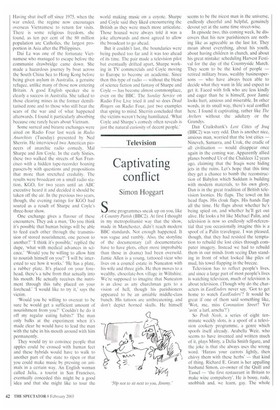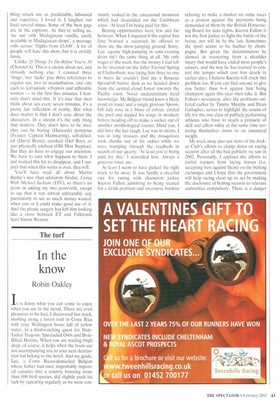Captivating conflict
Simon Hoggart
Some programmes sneak up on you, like A Count-1y Parish (BBC2). At first I thought in my metropolitanist way that the show, made in Manchester, didn't reach modern BBC standards. Not enough happened. It was vague and rambly. Also, the storyline of the documentary (all documentaries have to have plots, often more improbable than those in drama) had been oversold. Jamie Allen is a young, tattooed vicar who lives on a council estate in Nuneaton with his wife and three girls. He then moves to a wealthy, chocolate-box village in Wiltshire. We're supposed to imagine that Nuneaton is as close as any churchman gets to a vision of hell, though his parishioners appeared to be an amiable middle-class bunch. His tattoos are unthreatening, and don't depict horned skulls. He himself
seems to be the nicest man in the universe, endlessly cheerful and helpful, genuinely devout yet at the same time street-wise.
In episode two, this coming week, he discovers that his new parishioners are nothing like as agreeable as the last lot. They moan about everything, about his youth, about having children in church, and about his great mistake: scheduling Harvest Festival for the day of the Countryside March. They seem to be the kind of people — retired military brass, wealthy businessper sons who have always been able to decide what they want in life and expect to get it. Faced with folk who are less kindly and eager than he is himself, poor Jamie looks hurt, anxious and miserable. In other words, in its small way, there's real conflict here. I found it captivating, rather like The Archers without the adultery or the Grundys.
Dan Cruikshank's Lost Cities of Iraq (BBC2) was very odd. Dan is another nice, anxious man, worried that the lost cities — Nineveh, Samarra, and Urak, the cradle of all civilisation — would disappear once again in the coming war. Apparently allied planes bombed Ur of the Chaldees 12 years ago, claiming that the Iraqis were hiding jets in the ruins. Let's hope that this time they get a chance to bomb the reconstruction of Babylon which Saddam is building with modern materials, to his own glory. Dan is in the great tradition of British television loonies. He flaps. The towel on his head flaps. His cloak flaps. His hands flap all the time. He flaps about whether he's being spied on, and whether he'll get out alive. He looks a bit like Michael Palin, and television is now so endlessly self-referential that you occasionally imagine this is a spoof of a Palin travelogue, I was pleased, though, that they had resisted the temptation to rebuild the lost cities through computer imagery. Instead we had to rebuild them in our minds from seeing Dan standing in front of what looked like piles of mud, his towel flapping in the breeze.
Television has to reflect people's lives, and since a large part of most people's lives is watching television, much of television is about television, (Though why do the characters in EastEnders never say, 'Got to get home to watch EastEnders'? It would be great if one of them said something like, `Wot, me, miss Coronation Street? Yer 'avin' a larf, arncha'!')
So Posh Nosh, a series of eight tenminute weekly slots, is a spoof of a television cookery programme, a genre which spoofs itself already. Arabella Weir, who seems to have invented and written much of it, plays Minty, a Delia Smith figure, and the joke is that she always uses the wrong word, 'Harass your carrots lightly, then chivvy them with these herbs' — that kind of thing. Richard E. Grant is her appalling husband Simon, co-owner of the Quill and Tassel — 'the first restaurant in Britain to make wine compulsory'. He is bossy, rude, snobbish and, we learn. gay. The whole
thing struck me as predictable, laboured and repetitive. I loved it; I laughed out loud several times. Some of the best gags are in the captions. As they're telling us, 'we use only Madagascan vanilla, easily available in Madagascan shops', a message rolls across: 'flights from £3,800'. A lot of people will hate this show, but it is awfully funny.
Unlike 20 Things To Do Before You're 30 (Channel 4). This is a sitcom about sex, and virtually nothing else. I counted three 'shags', two 'fucks' plus three references to regular sex, two to masturbation, and one each to lesbianism, vibrators and inflatable women — in the first five minutes. I honestly don't mind this. If it's true that men think about sex every seven minutes, it's a pretty fair reflection of reality. But what does matter is that I don't care about the characters. In a sitcom it's the only thing that matters. They don't have to be nice; they can be boring (Hancock) pompous (Frasier; Captain Mainwaring), self-deluded (David Brent), crooked (Del Boy), or just physically unclean (Old Man Steptoe). But they do have to engage our attention. We have to care what happens to them. I just wanted this lot to disappear, and I suspect that when this series is over, they will.
You'll have read all about Martin Bashir's less than adulatory biodoc, Living With Michael Jackson (ITV), so there's no point in adding my two penn'orth, except to say that it was almost unbearably sad, particularly to see so much money wasted, when you or I could make good use of it. And the plastic surgery has left him looking like a cross between ET and Falklands hero Simon Weston.



























































 Previous page
Previous page